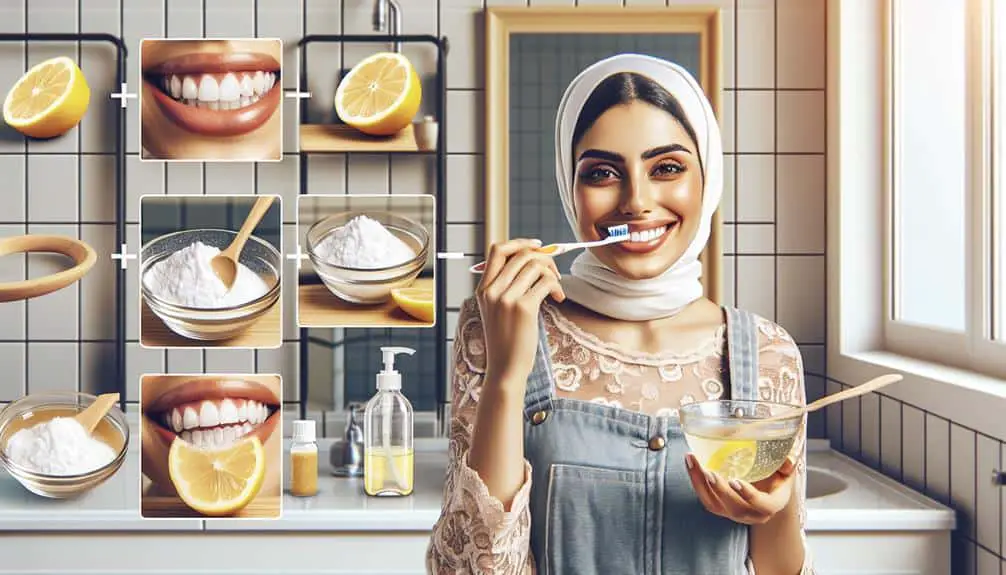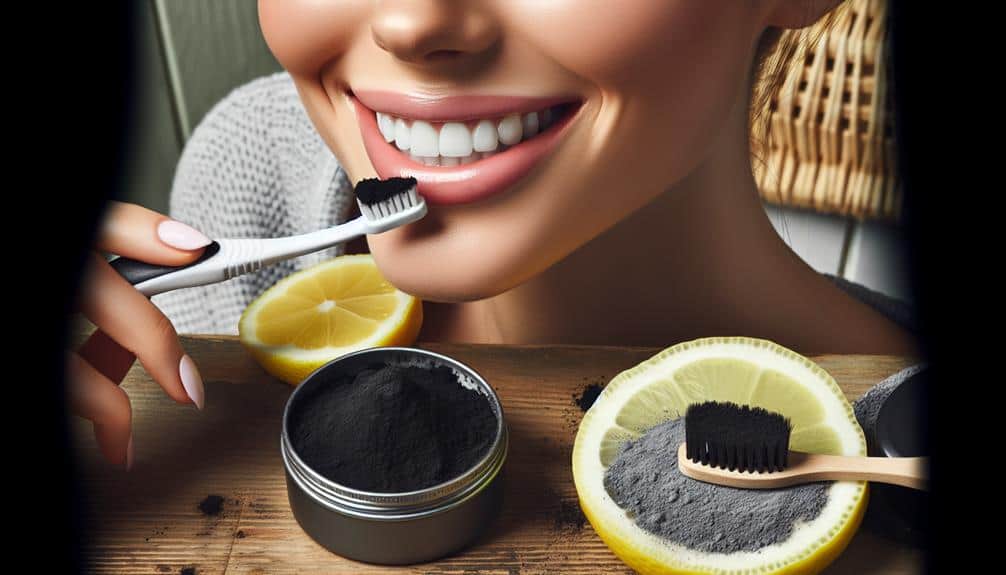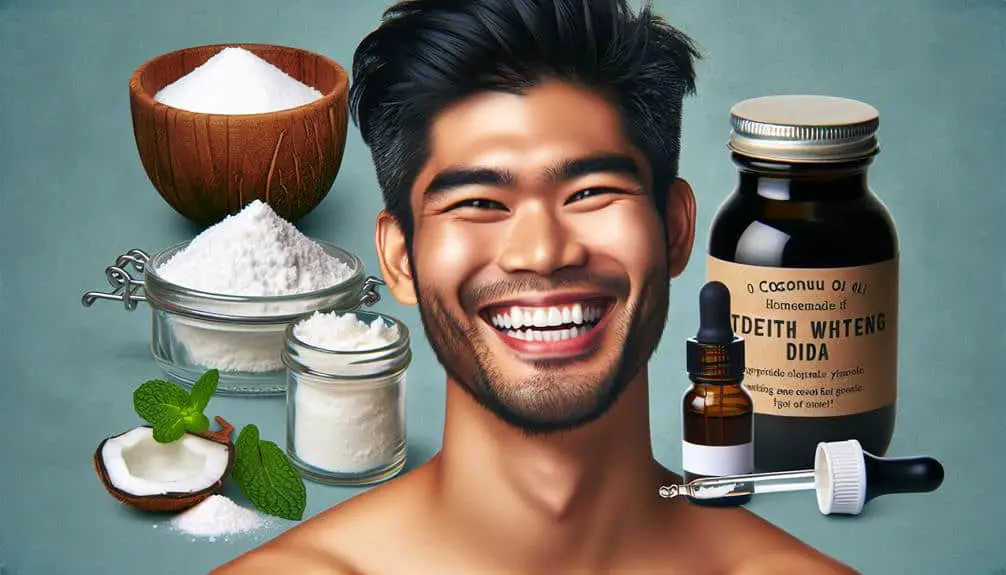Guarantee the safety of DIY teeth whitening hacks by understanding the key considerations that underpin their effectiveness and protect your oral health. Awareness of potential risks like eroding tooth enamel with natural remedies, and consulting with dental professionals before trying at-home treatments, are crucial. Common ingredients like lemon juice for whitening and baking soda for removing stains should be used in moderation and with caution. Expert tips from dental professionals on safe whitening practices stress the importance of using tested and approved products with safe concentrations.
Prioritize your oral health by taking necessary precautions to maintain the safety of these DIY teeth whitening hacks.
Key Points
- Natural ingredients like lemon and baking soda are safe for teeth.
- DIY methods use common household items with minimal risk.
- Consultation with dental professionals ensures safety and effectiveness.
- Following instructions and using in moderation prevent adverse effects.
- Prioritizing oral health and taking precautions guarantee safe whitening practices.
Benefits of DIY Teeth Whitening
When whitening your teeth at home, you can enjoy the benefits of convenience and cost-effectiveness compared to professional treatments. DIY teeth whitening offers cost-effective solutions that can provide quick results, making it an attractive option for those seeking a brighter smile without breaking the bank.
Many over-the-counter whitening kits and natural remedies are readily available, allowing you to whiten your teeth in the comfort of your own home at a fraction of the cost of professional treatments. These DIY methods often utilize common household ingredients like baking soda, hydrogen peroxide, or activated charcoal, which can effectively remove surface stains and lighten the shade of your teeth.
Furthermore, the convenience of DIY teeth whitening means you can incorporate it into your daily routine without having to schedule appointments or travel to a dental office. With consistent use, many home remedies can lead to noticeable improvements in the color of your teeth, giving you a brighter and more confident smile in a relatively short period.
Safety Considerations for Home Remedies
Taking into account the safety implications of utilizing home remedies for teeth whitening is essential to guarantee ideal oral health results. While DIY teeth whitening methods can be cost-effective and convenient, it's vital to be aware of potential risks and side effects associated with these practices.
Some natural ingredients used in home remedies, such as lemon juice or baking soda, may erode tooth enamel if not used correctly, leading to increased sensitivity and vulnerability to decay. Alternatives like activated charcoal or hydrogen peroxide, which are popular in DIY whitening, can also pose risks if misapplied or used excessively. Furthermore, the effectiveness of home remedies varies among individuals, and results may not always meet expectations.
To ensure the safety of DIY teeth whitening, it's advisable to consult with a dental professional before trying any home remedies. Dentists can provide guidance on suitable methods based on individual oral health needs, minimizing the likelihood of adverse effects. Prioritizing safety and understanding the potential risks associated with home remedies is critical for maintaining optimal oral health while seeking to achieve a brighter smile.
Common Ingredients in Natural Whiteners
To explore the effectiveness of natural teeth whiteners, understanding the common ingredients used in these remedies is essential. Two prevalent ingredients in DIY teeth whitening hacks are lemon juice and baking soda. Lemon juice's citric acid may help in whitening teeth, but its acidic nature raises concerns about enamel erosion, so caution is advised. Baking soda, known for its mild abrasive properties, can help scrub away surface stains when used gently.
Another popular ingredient is coconut oil, often used in oil pulling methods. Coconut oil's lauric acid has antimicrobial properties and may contribute to oral health but evidence supporting its whitening effects is limited. Turmeric, a spice with natural anti-inflammatory and antimicrobial properties, is also sometimes used. However, its vibrant yellow hue may temporarily stain teeth but is believed to be counteracted by its whitening effects over time.
When utilizing these ingredients, remember that individual responses may vary, and consulting with a dental professional is recommended, especially if you have sensitive teeth or existing dental concerns.
Precautions for DIY Teeth Whitening
Considering the potential risks associated with using DIY teeth whitening remedies, being aware of certain precautions is vital to safeguard your oral health. While DIY teeth whitening can be effective, it's important to exercise caution to prevent any adverse effects on your oral health. First and foremost, consult with your dentist before trying any at-home whitening remedies. Your dentist can provide professional guidance tailored to your specific oral health needs and identify any underlying issues that might be aggravated by teeth whitening.
Another precaution to keep in mind is to use DIY whitening remedies in moderation. Overuse of certain ingredients like lemon juice or baking soda can erode tooth enamel, leading to long-term damage. Additionally, always follow the instructions carefully and avoid leaving whitening agents on your teeth for longer than recommended to prevent sensitivity or irritation.
Prioritizing your oral health by taking these precautions will help you achieve a brighter smile safely and effectively. Remember, when in doubt, seek professional advice to make sure your teeth whitening journey is a positive experience for your oral health.
Expert Tips for Safe Whitening Practices
For safe and effective whitening practices, it's essential to follow expert tips recommended by dental professionals. Seeking professional advice before engaging in any teeth whitening procedures is vital to guarantee the safety and efficacy of the methods you choose to employ. Dental professionals can provide tailored recommendations based on your individual oral health needs and guide you towards the most effective methods for achieving a brighter smile.
When it comes to safe whitening practices, professional advice often emphasizes the use of reputable whitening products that have been tested and approved by dental associations. These products typically contain safe concentrations of whitening agents to prevent damage to your teeth and gums. Additionally, following the recommended usage instructions and avoiding overuse of whitening products are key aspects of safe whitening practices.
Frequently Asked Questions
Are DIY Teeth Whitening Hacks as Effective as Professional Treatments?
When it comes to teeth whitening, professional treatments generally offer quicker and more noticeable results than DIY hacks. Safety concerns are essential; consult a dentist for advice on the most effective and safe options for your smile.
Can DIY Teeth Whitening Cause Damage to the Enamel of the Teeth?
When whitening teeth with DIY methods, it's important to think about enamel protection. Misconceptions about safety exist, but proper techniques and ingredients can minimize risks. Understanding the impact on enamel is key to safe whitening practices.
How Often Should DIY Teeth Whitening Be Done to See Noticeable Results?
When aiming for that gleaming smile, a good rule of thumb is to engage in DIY teeth whitening no more than once a week. To witness noticeable results, consistency is key over a few weeks.
Are There Any Long-Term Effects of Using DIY Teeth Whitening Methods?
Using DIY teeth whitening methods can lead to potential risks like enamel damage and gum irritation. It's important to follow recommended whitening frequency to avoid long-term effects on your oral health. Consult a dentist for guidance.
Are There Any Specific Dietary or Lifestyle Changes That Can Enhance the Results of DIY Teeth Whitening Hacks?
To enhance the results of your DIY teeth whitening hacks, consider dietary modifications like consuming less staining foods and beverages, and adopt lifestyle habits such as quitting smoking. These, combined with natural remedies and excellent oral hygiene practices, can boost your whitening efforts.


